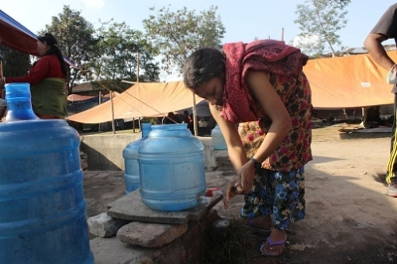 Cleanzine: your weekly cleaning and hygiene industry newsletter 18th April 2024 Issue no. 1110
Cleanzine: your weekly cleaning and hygiene industry newsletter 18th April 2024 Issue no. 1110
Your industry news - first
The original and best - for over 20 years!
We strongly recommend viewing Cleanzine full size in your web browser. Click our masthead above to visit our website version.
Emergency messaging critical in preventing cholera after Nepal earthquake
 WaterAid Nepal has begun an emergency response programme providing water, sanitation and hygiene services to districts hit by the recent earthquake.
WaterAid Nepal has begun an emergency response programme providing water, sanitation and hygiene services to districts hit by the recent earthquake.
The development organisation, which has been working in Nepal since 1987, will work with long established partners in five regions providing water purification tablets and hygiene kits to survivors, ensuring safe water in areas where the supply has been cut off and installing emergency sanitation measures such as pit latrines and trenches.
In many areas, water and sanitation infrastructure has been severely damaged in the earthquake, leaving people without clean water and nowhere safe to go to the toilet. In these conditions, there is high risk of an outbreak of waterborne diseases such as cholera, typhoid and diarrhoea which could lead to a second humanitarian crisis in the affected regions.
WaterAid Nepal has also begun radio broadcasts urging survivors of Nepal's devastating earthquake to take extra precautions with water, personal hygiene and in toilet use, to help prevent the spread of cholera, typhoid and other waterborne diseases.
The messages, carried by national radio, urge listeners to boil milk and water before drinking, to wash hands with soap frequently and to dispose of human waste properly, among other advice.
More than 7,500 people are now known to have died in the earthquake on 25th April, with the UN estimating more than 8 million people have been affected. An estimated 60,000 people have been affected in the communities where WaterAid works in Nepal, including Gorkha district, the epicentre of the earthquake.
Over the weekend, WaterAid's partner organisations with our funding and support reached 4,565 people with enough water purification tablets to last 10 days. Included in this number were 1,300 children whose families were given water purification supplies as part of a Ministry of Health emergency vaccination programme.
WaterAid expects to reach thousands more in coming days as further supplies, including emergency community water filters, water purification tablets, hygiene kits containing buckets, soap, cloths and sanitary towels and other items are received.
"We are and remain an organisation that is focused on development work but the scale of need following the earthquake is such in Nepal that we and our partners feel compelled to act, knowing that we must act now to try and avoid a second disaster in the form of an outbreak of disease such as cholera," says Tom Palakudiyil, WaterAid's head of region - South Asia.
"WaterAid has a long history of working in the affected areas and through our partners we have an established network through which we can help provide emergency water and sanitation.
"We must not underestimate the huge challenges ahead. Many of the affected areas are remote and had very little infrastructure before and much of what infrastructure there is will have been destroyed. Getting to the affected districts will be challenging as will bringing in the equipment needed to rebuild.
"But WaterAid is here for the long term and committed to helping help rebuild Nepal, better and stronger than before."
* Before this crisis, nearly 13 million people in Nepal were without access to a basic, safe toilet and 3.6 million were without access to clean water. An estimated 1,900 children under five die each year in Nepal of diseases linked to a lack of safe water, basic sanitation and good hygiene practice.
* WaterAid's vision is of a world where everyone has access to safe water and sanitation. The international organisation works in 26 countries across Africa, Asia, Central America and the Pacific Region to transform lives by improving access to safe water, hygiene and sanitation in some of the world's poorest communities. Since 1981, WaterAid has reached 21 million people with safe water and, since 2004, 18 million people with sanitation.
* Around 1,400 children die every day from diseases caused by dirty water and poor sanitation.
* 748 million people are without safe water, or one in 10 in the world.
* 2.5 billion people are without adequate sanitation, or 39% of the world's population.
7th May 2015







